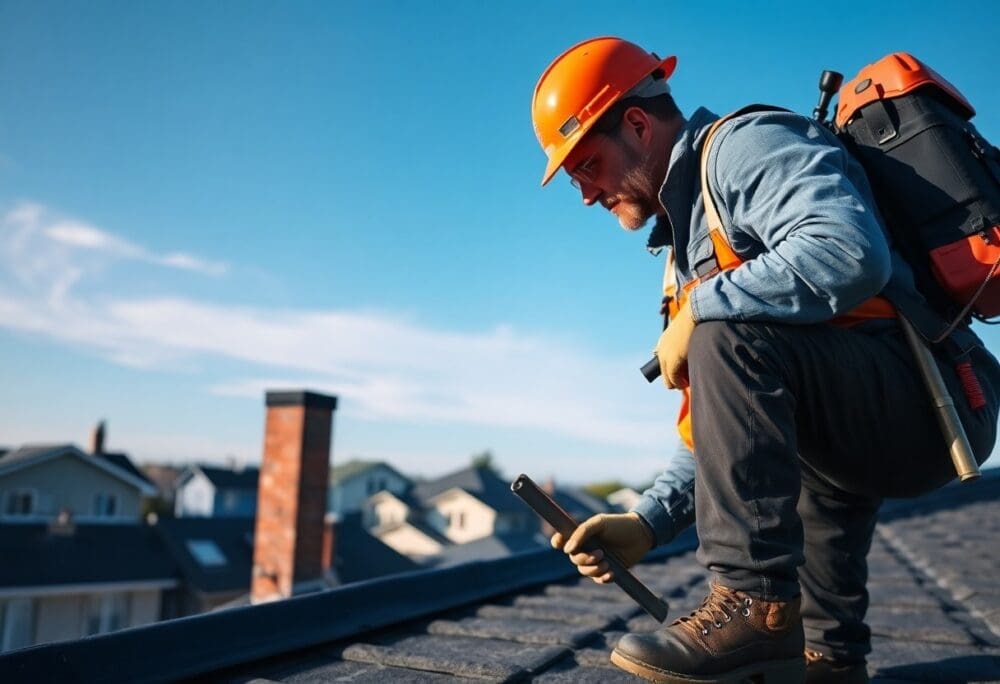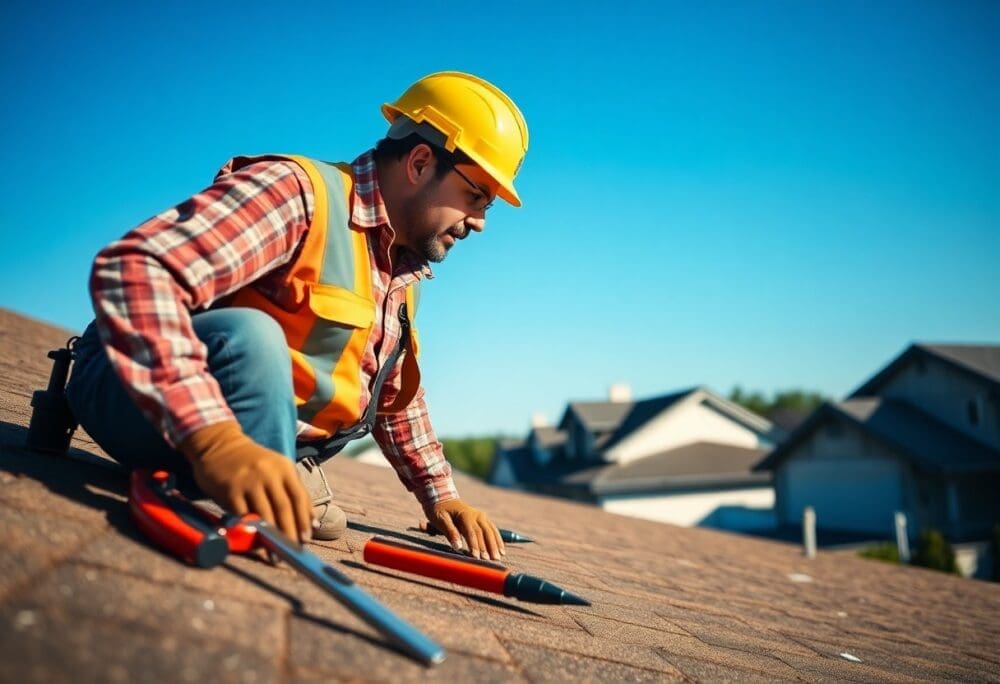Many homeowners overlook the importance of scheduling professional roof inspections, often leading to costly repairs down the line. By understanding when to schedule these evaluations, you can maintain the integrity of your roof and protect your investment. Whether you’re dealing with seasonal weather changes, preparing for a home sale, or suspecting potential damage, knowing the right times for a professional assessment can ensure your roof remains in optimal condition. This guide will help you identify the best times to seek expert advice for your roofing needs.
Key Takeaways:
- Schedule a professional roof inspection after significant weather events, like storms or heavy snowfall, to assess any potential damage early on.
- Consider annual inspections to prevent minor issues from escalating into major problems, ensuring the longevity of your roof.
- If you are planning to buy or sell a property, conducting an inspection can help address any roof-related concerns before transactions take place.
Importance of Regular Roof Inspections
Before you experience a significant issue, scheduling regular roof inspections is vital for maintaining your home’s integrity and value. These inspections allow you to catch small problems before they escalate, ultimately saving you money and time on repairs. Regular assessments also ensure your roof is ready to withstand the elements, enhancing its lifespan and protecting your investment.
Understanding Roof Lifespan
Any roof comes with a predetermined lifespan, typically spanning 15 to 30 years, depending on the materials used. Understanding this timeline helps you plan for inspections, maintenance, and potential replacements. By staying informed about your roof’s age and condition, you can better prepare for necessary actions, ensuring your home remains well protected.
Identifying Potential Issues Early
Importance of early detection can’t be overstated when it comes to roofing. Routine inspections help you identify potential issues such as leaks, damaged shingles, or weakened structural components before they lead to major problems. This proactive approach allows you to address concerns on your terms, avoiding costly emergency repairs.
But it’s not just about saving money. Catching potential issues early gives you peace of mind, knowing your home is safe and secure. Regular inspections enable you to take control of your roof maintenance schedule, ensuring you’re not waiting for a crisis to arise. By prioritizing early detection, you protect not only your roof but also the overall integrity of your home.
Recommended Inspection Schedule
Any homeowner should establish a systematic schedule for professional roof inspections to ensure your roof’s longevity and performance. Ideally, scheduling inspections twice a year—once in the spring and once in the fall—will allow you to identify potential issues before they develop into more significant, costly problems.
Seasonal Inspections
Inspections in each season serve as a proactive measure to catch any damage that may have occurred. Conducting an inspection during spring helps to identify wear caused by winter weather, while a fall inspection allows you to prepare your roof for the harsh winter months ahead.
Post-Storm Assessments
Assessments after severe weather events are important for safeguarding your roof’s integrity. After storms with high winds, hail, or heavy snowfall, it’s wise to have a professional evaluate any potential damage and address any concerns promptly.
Consequently, timely post-storm assessments can prevent minor issues from escalating into significant structural problems. You benefit from addressing damage early, thus saving money in repairs and enhancing the overall lifespan of your roof. Pay close attention to any leaks or visible damage immediately after a storm to ensure your home remains safe.
Signs Indicating the Need for Inspections
Noticing signs of wear or damage on your roof can indicate a need for a professional inspection. Pay attention to leaks, missing shingles, or excessive granules in gutters. For a detailed guide on when, why, and how to schedule a professional roof inspection, visit When, Why, And How to Schedule a Professional Roof.
Visible Damage
Any visible damage, such as cracked shingles, curled edges, or rusted flashing, should prompt you to schedule an inspection immediately. These signs can indicate underlying issues that may worsen over time if left unaddressed.
Age of the Roof
Below a certain age, your roof may require more frequent inspections to ensure its integrity. Most roofs last between 20 to 30 years; thus, if yours is approaching this lifespan, it’s advisable to start scheduling regular evaluations.
This proactive approach not only helps identify potential issues before they escalate but also ensures that your roof remains in optimal condition. Aging materials can become brittle, leading to leaks or structural problems, which is why regular inspections are necessary as your roof ages.
Hiring a Professional Inspector
All homeowners benefit from hiring a professional inspector to assess the condition of their roof. These trained experts can identify issues that may not be visible to the untrained eye, ensuring that you get a comprehensive understanding of your roof’s health. An inspection conducted by a professional can help you make informed decisions about repairs or replacements, ultimately saving you time and money in the long run.
Credentials to Look For
Beside choosing an inspector based on reputation, it’s necessary to check for their credentials. Look for certifications from reputable organizations like the National Roofing Contractors Association (NRCA) or similar local entities. These certifications indicate that the inspector has undergone training and adheres to industry standards, boosting your confidence in their evaluation skills.
Questions to Ask
Professional roof inspectors can provide you with valuable insights, so take the time to ask them important questions. Inquire about their experience, types of inspections offered, and whether they provide written reports. Knowing how they assess issues and what their process entails can help ensure you receive a thorough examination.
Plus, don’t hesitate to ask them about warranties and follow-up services. Understanding what happens after the inspection can clarify your next steps and give you peace of mind. Ask about common problems they encounter in your area and how frequently roofs need maintenance. Their answers will help you establish a long-term relationship with your inspector and ensure the best care for your roof.
Maintenance Tips to Extend Roof Life
Now is the perfect time to implement maintenance tips that can significantly extend the life of your roof. Regular upkeep helps prevent costly repairs in the future. Consider the following:
- Clean gutters and downspouts regularly to avoid water buildup.
- Inspect for signs of damage after major storms.
- Trim overhanging branches to reduce debris on your roof.
- Check flashing and seals around vents and chimneys.
- Schedule professional inspections annually.
Any proactive steps you take can prolong the lifespan of your roof.
Routine Maintenance Practices
One effective way to maintain your roof is by establishing a routine maintenance schedule. Aim to inspect your roof at least twice a year, ideally in spring and fall. This allows you to catch any minor issues before they escalate, such as loose shingles, cracks, or signs of wear. Keeping your roof clean and free of debris will enhance its efficiency and durability.
Common DIY Checks
Before calling in a professional, you can perform common DIY checks to assess your roof’s condition. Look for visible signs of wear, such as lifted or missing shingles, as well as any sagging areas that could indicate structural issues. Check the attic for leaks, moisture, or inadequate insulation. A thorough inspection could save you time and money before deciding whether further action is necessary.
Further, getting familiar with your roof’s typical performance can make it easier to identify potential problems early. Use binoculars to safely examine hard-to-reach areas and document any findings. By regularly assessing your roof, you’ll not only increase its lifespan but also maintain your home’s overall value and integrity.
Cost Considerations for Inspections
Unlike many home maintenance expenses, professional roof inspections can be an affordable investment compared to the potentially high costs of roof repairs or replacements. Understanding the costs associated with inspections helps you plan effectively and avoid unexpected financial burdens down the road.
Budgeting for Roof Care
Among the various aspects of home maintenance, allocating funds for roof inspections is important. Setting aside a budget for these inspections ensures that you can address any potential issues early, ultimately saving you money on larger repairs in the future.
Return on Investment
Inspections provide significant value, as they help you identify roof problems before they escalate into expensive repairs. By catching issues early, you not only preserve the integrity of your roof but also enhance your home’s overall value and curb appeal.
And by investing in roof inspections, you can extend the lifespan of your roofing system while ensuring your home remains safe and secure. This proactive approach leads to fewer emergency repairs and can improve your insurance costs over time, all contributing to a favorable return on your investment.
Q: How often should I schedule a professional roof inspection?
A: It is recommended to schedule a professional roof inspection at least once a year. However, if you live in an area with extreme weather conditions, such as heavy snowfall, intense rain, or strong winds, more frequent inspections, ideally every six months, may be necessary. Additionally, it’s wise to arrange for a professional inspection after any major weather event that could impact your roof’s integrity.
Q: What time of year is best to schedule a roof inspection?
A: The best time to schedule a roof inspection is during the spring or early fall. These seasons typically provide mild and dry weather conditions, allowing inspectors to evaluate the roof without the hindrance of snow, ice, or extreme temperatures. Scheduling inspections during these periods can help identify any damage that may have occurred during harsh winter months or prepare your roof for the upcoming winter.
Q: Can I perform a roof inspection myself, or is it necessary to hire a professional?
A: While homeowners can conduct a visual inspection from the ground or a safe vantage point, it’s generally recommended to hire a professional for a thorough assessment. Professionals have the training and experience to identify issues that may not be visible to the untrained eye, such as hidden leaks, structural damage, or potential weaknesses. A professional roof inspection can also provide peace of mind and ensure that any necessary repairs are addressed promptly.






